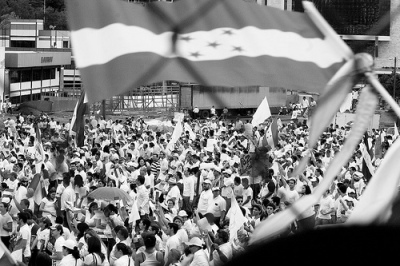Caught between calls to abstain from voting and fear of violence on election day, Porfirio “Pepe” Lobo from the National Party was elected President of Honduras, with Elvin Santos from the Liberal Party in second place. The elections themselves are controversial: indirectly they support the ousting of former president Manuel Zelaya in June by a military coup. At the time, Zelaya was replaced by Roberto Micheletti, then President of the National Congress, who acted as interim until the elections of November.
Few countries have confirmed whether they will acknowledge the results of the elections, while leftist governments have stated open rejections: for the moment, Argentina, Brazil, Ecuador and Venezuela have not recognized president-elect Porfirio Lobo, The Guardian reports.
In spite of the uncertainty, as well as the difficult political and social situation of the country, the voting process proceeded without major problems. While the Supreme Electoral Tribune reported a turnout of 60% [es], a percentage higher than expected but still problematic for declaring a representative majority.

Photo by user rbreve. Taken from Flickr following a Creative Commons license: http://www.flickr.com/photos/breve/3685439122/in/set-72157620912638868/
Opposing, strong opinions about the election can be found in the catrachan blogosphere.
La Gringa from La Gringa’s Blogicito shared her surprise when noticed the lack of militarization at the polling places:
I went to three polling places on Sunday in La Ceiba (the third largest city in Honduras) and one in El Porvenir (a smaller town) in the department of Atlantida. The polling places were crowded with hardly any police or military in sight. I was surprised at the latter because I was worried they would be needed for security.
Blogger David Moran from El Catracho believes that high-percentage of voters represented the discontent [es] against former president Zelaya:
El hecho destacable de las elecciones fue la notoria participación de los hondureños, algo sumamente necesario para contrarrestar el boicot de Zelaya y sus adláteres chavistas. Lo único que hicieron con sus protestas callejeras y actos vandálicos fue despertar nuestra conciencia democrática y ponerla en su contra.
On the other side of the spectrum, the National Front of Resistance Against the Coup’d’Etát [es] calls to reject the president-elect:
Hacemos un llamado a los gobiernos y movimientos sociales democráticos y honestos en el mundo a rechazar los resultados de la farsa electoral y a desconocer el pretendido gobierno que se instale a partir del 27 de enero.
From Mirada de Halcón, Juan Carlos Rivera considers that the elections can be used to “clean” [es] the actions of the coup:
Ahora, los magistrados del Tribunal, aliados del régimen de facto, tuvieron que recurrir a la trampa para intentar convencer a la comunidad internacional de que las elecciones “fueron masivas y transparentes” y, lograr en consecuencia, lavar el golpe de Estado y absolver de los delitos a los ejecutores.
Porfirio Lobo, who will be sworn in as president in January 2010, was Zelaya's opponent in the general elections of 2005. He is part of centre-right oriented National Party, and was President of the National Congress of Honduras until 2006. According to Spanish newspaper El País [es], he is 62 years old, a father of 11 children, and has a degree in Business Management from Miami University.
Translated by Issa Villarreal







1 comment
according to the Tribunal Electoral, the participation percentage was only of 45%, you can see that in the official website http://200.107.126.222/escrutinio/pais.php
there are 2,113,229 votes over registered voters, 4,611,211, that’s only 45% of voters, or 55% of abstencion!